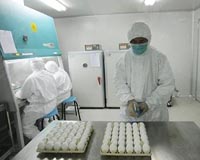| . |  |
. |
Hong Kong (AFP) Sept 22, 2009 The World Health Organization said Tuesday it was worried that up to a quarter of the fatal swine flu cases in the Western Pacific were patients with no underlying medical condition. By September 19, an estimated 25 percent of the 352 death cases reported in the region had no prior medical problems, the WHO announced at its Western Pacific annual conference in Hong Kong. "That worries us very much. We are looking into it," Takeshi Kasai, the organisation's regional adviser on communicable disease surveillance and response, told the media on the sidelines of the conference. In other regions the proportion of swine flu fatalities with no underlying medical condition ranged from 20 to 50 percent, he said. Kasai said one of the more plausible hypotheses virologists had come up with was that the virus replicated more rapidly in those patients. He said that the WHO was also concerned that young adults were dying of swine flu, while small children and elderly people tend to be the main groups that succumb to seasonal influenza. The West Pacific region covers 37 countries and extends from China and Mongolia to Australia, New Zealand and French Polynesia.
Share This Article With Planet Earth
Related Links Epidemics on Earth - Bird Flu, HIV/AIDS, Ebola
 Swine flu vaccine production lags as death toll mounts
Swine flu vaccine production lags as death toll mountsGeneva (AFP) Sept 18, 2009 Production of swine flu vaccines will fall "substantially" short of the amount needed to protect the global population, the World Health Organisation warned Friday as the pandemic death toll rose. "Current supplies of pandemic vaccine are inadequate for a world population in which virtually everyone is susceptible to infection by a new and readily contagious virus," WHO director general ... read more |
|
| The content herein, unless otherwise known to be public domain, are Copyright 1995-2009 - SpaceDaily. AFP and UPI Wire Stories are copyright Agence France-Presse and United Press International. ESA Portal Reports are copyright European Space Agency. All NASA sourced material is public domain. Additional copyrights may apply in whole or part to other bona fide parties. Advertising does not imply endorsement,agreement or approval of any opinions, statements or information provided by SpaceDaily on any Web page published or hosted by SpaceDaily. Privacy Statement |